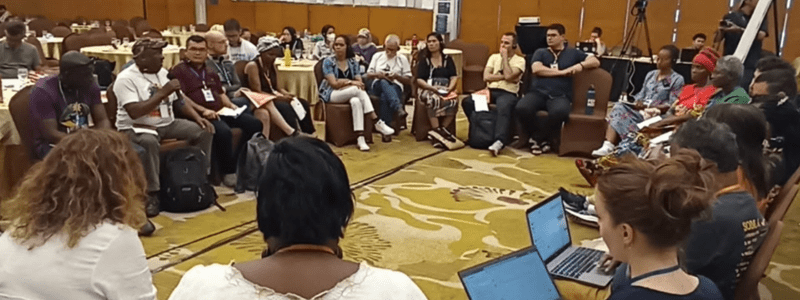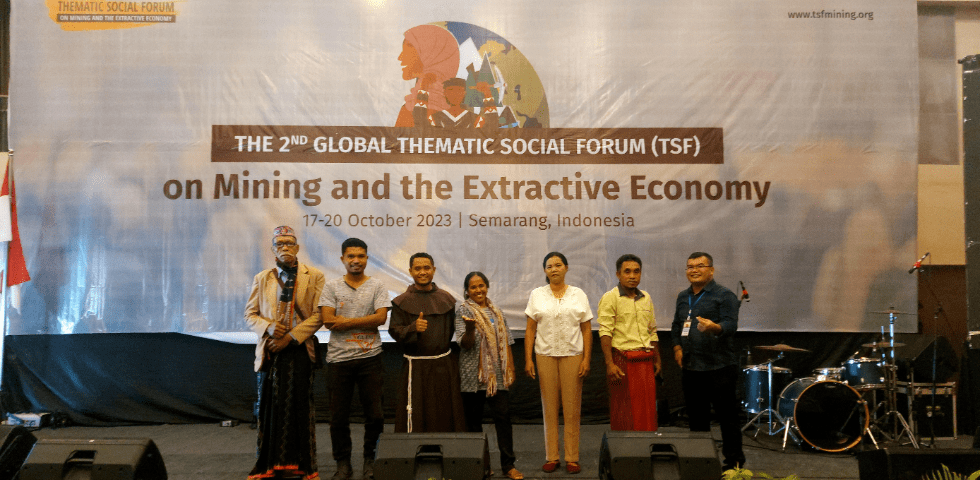The meeting was held in Semarang, Central Java-Indonesia, from 16-20 October 2023, where the participants came from 60 nationalities around the globe, including a representative from JPIC Office in Rome, Br. Taucen OFM, a representative from Brazil, Br. Rodrigo Peret OFM, and a representative from Indonesia, Br. Mikael Gabra Satrio, OFM.
The first day (16/10) was a welcoming ceremony for all participants at MG Setos Hotel in Semarang, which culminated at dinner for familiarizing each other and enjoying diversity.
The objectives of TSF were explained by the steering committee on the next day (17/10). Those are to update the understanding about landscape of the international mining industry and extractivism, to strengthen the voice of mining-affected communities, to identify areas of mutual interest-common concern and potential areas of collaboration, to review the action agenda of TSF mining 2018, and to strengthen the existing coordination mechanism.
Later, the participants shared their hopes and ideas as well as to explore the theme on Mining and Extractive Economy by dismantling current realities of exploitative economic systems through personal and communal testimony, followed by some descriptive analysis and deep discussion by the panelists. The main tendency was to understand more details about extractive economy.
The next agenda for the third day (18/10) was a space for workshops both in the morning and in the afternoon, and each plenary as well. Clearly, the TSF, which was attended by mining-affected communities, including Peasants, Indigenous Peoples, small-scale farmers, fisherpeople, migrants, refugees, pastoralists, displaced persons and working-class women, shared the voice of the cessation of mining exploration, which has obviously caused severe environmental damage, created a number of conflicts in the community, impoverishment and displacement of those who are powerless and poor, and also caused a number of diseases that effected children and women in particular. The different narrative was presented against a well-being and well-having narrative from the transnational corporations and the development agenda. As a conclusion, by reclaiming the narrative of just-transition minerals, the participants agreed to the right to say no to mining and extractivism, followed by calling for global solidarity, appealing TSF as a movement, and committing to an action plan.

Therefore, on the fourth day (19/10), the TSF provided a day for open space workshops in order to encourage mining-affected communities to voice their rights and to defend their land and culture, that they have to criticize the green development agenda and to urge the stakeholders and policymakers around the world for a movement from fossil-fuel to clean energy and not to choose the increasingly barbaric exploitation of nature. The TSF encouraged to promoting alternatives to extractivism such as supporting grassroots and national initiatives around developing and expanding protection mechanisms for defenders opposing mining and other extractive industries; exploring the concept of rights of nature as a means of defending human and more-than-human nature against mining and extractive industries; to support agroecology and ecological activities and food sovereignty including degrowth economy; etc. At the end, the participants realized that the TSF is a movement and a process, that they need to collaborate in global and local actions. For this reason, all hope, discussions, and shared experiences will be stated in the Declaration.
On the last day of the meeting (20/10), the implementation of global solidarity was approved by visiting three mining areas around Central Java: Dieng (cement factory), Kendeng (geothermal mine), Jepara (iron sand mine). In those areas, the participants had an opportunity to listen directly to the testimony of local people as mining-affected community on how grassroots are struggling to build their own narratives on human-nature against extractive industries.
One can say that human beings must always be recognized as a part of the nature. And these days we need a healthy ecology. As Pope Francis says: “a healthy ecology is the result of human interaction between human beings and the environment, as occurs in the indigenous cultures and has occurred for centuries in different regions on the earth. Human groupings have often ‘created’ an environment, reshaping it in some way without destroying it or endangering it.” (Laudate Deum, art.27).
Br. Taucen Girsang, OFM
Vicedirectore JPIC OFM-Rome

